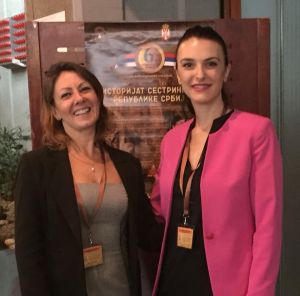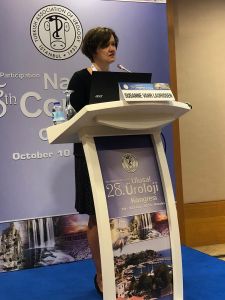EAUN Chair and Chair Elect visit national urological nursing congresses in Turkey and Serbia

One of the EAUNs main aims is to standardise urological nursing care across Europe. It also seeks to encourage and support urological nursing societies in their host nations, in order to share exemplary practices and act as a platform to develop evidence-based care using the EAUN guidelines. To help realise this purpose, Paula Allchorne (EAUN Chair Elect) and Susanna Vahr Lauridsen (EAUN Chair) were invited to give talks in Serbia and Turkey.
I felt honoured to attend the 6th national congress in Serbia entitled ‘History of nursing in the republic of Serbia’. By giving such talks, I hope to enhance understanding of nursing care throughout Europe and ensure that the EAUN continues to improve and standardise the quality of care across Europe and globally. The congress covered history through practice, work of professional organisations, education and heroines of our time, in recognition of

Ms. Paula Allchorne with Ms. Natasa Dimoska from Belgrade
the incredible efforts of nurses over the years to deliver the best healthcare possible. I was asked to deliver a keynote lecture on ‘History of nursing in Great Britain: the cradle of nursing?’.
Florence Nightingale
Using a historical example, I initially focused my lecture on Florence Nightingale in order to make comparisons with current nursing innovations. Florence Nightingales impact on nursing has often been simplified and merely shows the caring face of nursing, as epitomised by ‘the lady of the lamp’ image, when in fact she was an innovator in the complete care of patients. She was one of the first proponents of patient safety and quality improvement.
She was an accomplished statistician, recognised by her mathematical peers and praised for developing a highly visual way of presenting complex annualised data sets on mortality and morbidity data. She did so to persuade generals and politicians of the fact that the impact of disease was crippling a nation’s army far more than injuries in battle. In doing so she improved general health conditions. She realised education was key and nursing needed to be developed as a profession.
General Nursing Council
In 1860, the Nightingale Training School opened at St. Thomas’s Hospital in London. Her actions changed the face of nursing, from a mostly untrained profession to a highly skilled and well-respected clinical profession. In 1919, the General Nursing Council was established and adapted in 1983 to United Kingdom Central Council for Nursing, Midwifery and Health Visiting. In 2009 all nursing courses in the UK became degree level.
Part of multidisciplinary team
I continued my talk by drawing parallels with European nursing today. The UK was perhaps the spark that initiated nursing professionalism, but the profession is developing globally this millennium. Florence Nightingale, in her role as leader of quality improvement, would certainly have supported the aim of the EAUN: to ensure that all nations come together to standardise and improve care across the world. Nursing has evolved over the last twenty years, we have a stronger voice and presence, and our practice is evidence-based and integrated within the medical profession as a key part of the multidisciplinary team. The most important thing is to ensure everything we do is patient centred and patients are at the heart of everything we do to improve quality of care. This is being enhanced by nurses taking on more and more advanced practices. This is particularly true in the field of urology over the last twenty years.
Improve efficiency and quality of care
Global attendance at the EAUN meetings demonstrates the collaboration and standardisation in the field of nursing. Everyone wants the same: to improve efficiency and quality of care. Improving quality means addressing what matters to patients – making pathways patient centred. Florence Nightingale said: ‘Little can be done in a spirit of fear’. We need to ensure we speak up for our patients and provide standardised evidence-based practice.
And like Florence, we must often persuade politicians and budget holders of the importance of nurses and exemplary nursing care to the health of the nation. We should ask ourselves 3 questions:
• Where are we now ?
• Where are we going?
• What has changed?

Ms. Susanne Vahr answering questions after the lecture on rehabilitation
Inspiration for future collaboration between societies
I was invited to talk at the 9th National Congress of Urology Nursing in Antalya (TR) from 11 to 12 October. The congress was held at the fabulous Rixos Sungate hotel and it was attended by about 50 nurses. It was a very well organised conference and a good example of the possibility to exchange knowledge about nursing practices when the interest is there. Ayfer Özbas, current president of the Turkish Association of Urology Nurses, had arranged translators from the first day, so th,e delegates could understand my presentations about rehabilitation of bladder cancer patients undergoing radical cystectomy and about EAUN indwelling catheter guidelines to prevent urinary tract infections. I was happy to understand all Turkish presentations. The programme included presentations about both benign and cancer diseases in urology and about patient involvement and ethics
in care of the urology patient. The delegates were very interested in discussion about differences between practices and how to overcome these.
“EAUN Chair Elect: ‘Little can be done in a spirit of fear”
Future collaborations
I was very impressed by the great hospitality and the inspiration I found for future collaboration between the two societies. A meeting was arranged on day one to discuss EAUN activities and benefits of membership with representatives from the Turkish Association of Urology Nurses, vice president Ates Kadıoglu from Türk Uroloji Dernegi and me. The meeting resulted in exchange of propositions for future collaborations, such as fellowship exchange, international multicentre studies and presentations at the next EAUN meeting. I was invited to a friendship dinner and a faculty dinner which I appreciated very much. The EAUN looks forward to welcoming the
Turkish nurses at the 21st EAUN Annual Meeting in Amsterdam in 2020.
________________________________________________________________________________
Susanne Vahr Lauridsen, RN, Master’s degree in HRD, PhD, EAUN Chair, Copenhagen (DK), s.vahr@eaun.org
Paula Allchorne, MBA, Dip, RGN – Executive MBA, EAUN Chair Elect, London (UK), p.allchorne@eaun.org

